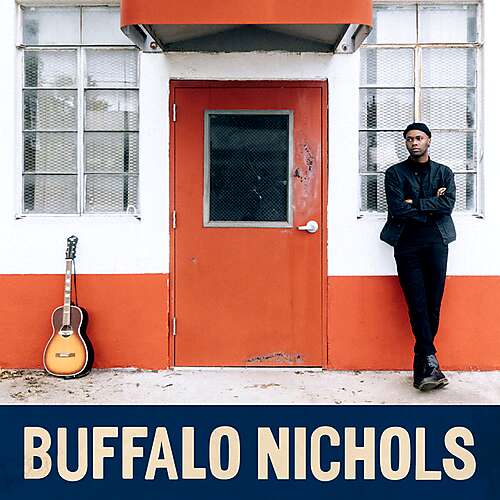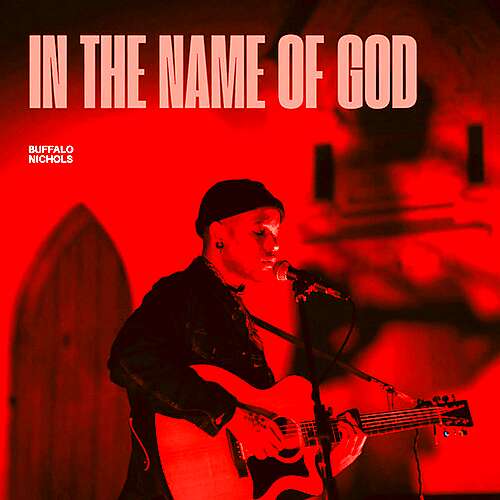Buffalo Nichols
Buffalo Nichols
[ he/him ]
country: Wisconsin, USAgenre: Folk/Country
styles: Indie Folk, Singer-Songwriter, Folk Rock, Acoustic, Americana

Buffalo Nichols
 LP
LP
Spotify Bandcamp Soundcloud
Reviews and Comments
Buffalo Nichols—Fat Possum’s first solo blues signing in nearly 20 years—has announced the release of his self-titled debut album, due out on October 15th, 2021. The Austin, TX-based guitarist, songwriter, and vocalist has also shared lead single “Lost & Lonesome,” a tender, aching ballad. “‘Lost & Lonesome’ was inspired by years of traveling alone, wandering city streets looking for a place to call home maybe for a night, maybe forever,” explains Carl “Buffalo” Nichols. “It takes you back to those moments in life when you must leave home either physically or figuratively—going somewhere unfamiliar and on your own. The soundtrack to a wandering soul. An ode to loneliness. When you see a wandering soul, all you can do is wonder how they got there. This song gives a glimpse into the mind of that traveler looking for a friend and a place to call home.”
“Nichols’ spartan, self-titled debut album showcases not just his mesmeric fingerpicking, but also deep political beliefs…” - Mojo
“...Buffalo Nichols makes waves with his debut album” - Austin Monthly
“...one of the most promising debut records to come out in quite some time” - No Depression
"His compelling self-titled debut album introduces a visceral new force in the genre: to spare but endlessly dextrous guitar playing, Nichols bends the blues into new shapes, in the process examining African-American history and the issues and attitudes that still dog the communities he grew up in. A real find" - The Sunday Times (UK)
“The recordings...feature little more than his honeyed voice and bluesy guitar. But that simplicity, and vulnerability, make them special.” - The Milwaukee Journal Sentinel
“Exceptional” - Americana Highways
The self-titled debut album from Buffalo Nichols, Fat Possum’s first solo blues signing in nearly 20 years, arrived in stores last week to great press from Austin Monthly, Bandcamp, No Depression, Premier Guitar (‘Hooked’ series), Uncut (UK), Mojo (UK), The Milwaukee Journal Sentinel, and more—including an interview and live session with WNYC’s Soundcheck. The album’s release follows singles “How To Love,” “Lost & Lonesome,” and “Back On Top,” which have been earning Nichols additional early praise from Rolling Stone Country, Guitar World, and more.
The Austin,TX-based Carl “Buffalo” Nichols is currently on the road in support of Drive-By Truckers as well as playing a handful of solo shows throughout, and he performs next tonight at MOTR Pub in Cincinnati, OH. He also recently announced a run of dates with St. Paul and the Broken Bones in early December. A current itinerary is below.
Since his earliest infatuations with guitar, Nichols has asked himself the same question: How can I bring the blues of the past into the future? After cutting his teeth between a Baptist church and bars in Milwaukee, it was a globetrotting trip through West Africa and Europe during a creative down period that began to reveal the answer.
“Part of my intent, making myself more comfortable with this release, is putting more Black stories into the genres of folk and blues,” Nichols explains. “Listening to this record, I want more Black people to hear themselves in this music that is truly theirs.” That desire is embodied in his self-titled debut album, composed largely of demos and studio sessions recorded between Wisconsin and Texas.
Born in Houston and raised in Milwaukee’s predominantly Black North end, the guitar was Nichols’ saving grace as a young man. The instrument captured his fascination, and provided him with an outlet for self-expression and discovery in isolation. A friend invited the teenage guitarist to church for a gig and the opportunity proved to be Nichols’ much-needed breakthrough to music circles in the area. But over the following years, he began to feel overextended, and abandoned the demanding grind of a supporting role in nearly ten Milwaukee scene bands, none of which bore his vision as a lead performer. Stints in college and in the workforce led him overseas, where the appreciation of African-American folkways lit a renewed spark in Nichols. It was the bustling of jazz in places like the working class areas of Ukraine, or in Berlin cafes where expatriate Black Americans routinely treat fans to an enchanting evening of blues, that would lead to his a-ha moment. Nichols returned home to America, meditating on his own place in the music that holds the country’s truest values and rawest emotions between bar and measure. “Before this trip, it was hard for me to find that link between all these blues records I heard and people who are living right now. I figured out it’s not a huge commercial thing, but it still has value. So, I came home and started playing the blues more seriously, doing stuff with just me and my guitar,” Nichols says.
Nichols admits that anger and pain are realities that color the conversations and the autobiographical anecdotes behind his observational, narrative-based approach to songwriting. However, with his lyricism on Buffalo Nichols, he intends to provide a perspective that doesn’t lean heavily into stereotypes, generalizations or microaggressions regarding race, class and culture. The album sees Nichols wrestling with prescient topics, such as empathy and forgiveness, regret and loss, and the pitfalls of lives lived too close to the edge. At the forefront of each song is Nichols’ rich voice and evocative, virtuosic guitar-playing, augmented on half of the nine tracks by a simple, cadent drum line.
While acknowledging the joy, exuberance and triumph contained in the blues, Nichols looks intently at the genre’s origins, which harken back to complicated and dire circumstances for Black Americans. With this in mind, Nichols says there is a missing link, which he’s often used as a compass: Black stories aren’t being told responsibly in the genre anymore. To begin changing that, Buffalo Nichols gets the chance to tell his own story in the right way.
latest releases























